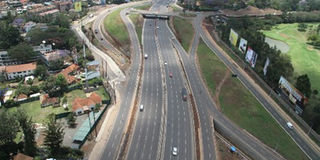Cash-strapped government to seek Sh1tn from private sector for roads

An aerial view of a stretch of Thika Road. The 50 km/h speed limit is back and here to stay.
The government will seek at least Sh1 trillion from the private sector for road construction as budget constraints force a shift in sourcing funds for infrastructure.
Turning to private industry is meant to ease pressure on government finances, Transport and Infrastructure principal secretary John Mosonik told Smart Company in an interview.
The money from the National Treasury is to be channelled to improving roads in the rural areas, while main roads will be handed to private investors to build and levy fees to recoup their investment.
The government hopes to mobilise Sh1 trillion by attracting the private sector in the management of the country’s busy highways.
The first phase of the programme under the Public Private Partnership law will be carried out on the Nairobi-Thika superhighway, the Nairobi-Mombasa highway, the Nairobi-Nakuru highway, and on the Southern Bypass, whose construction is expected to be completed in July 2015.
High traffic roads
“We expect to mobilise this money through private sector management of the roads, especially on the long-haul routes,” Mr Mosonik said.
The second phase will take into account other high traffic roads like the Nairobi-Mau Summit road, the Narok-Maasai Mara road, and the road from Mau Summit to Malaba.
These roads are to be handed over to the private sector in 2016. Major roads at the coast are also to be handed to the private industry.
The government has indicated that the Nairobi-Mombasa and the Nairobi-Nakuru highways are to be upgraded to dual carriageway status, but it has not given any timelines on the work.
However, they are to be handed over to the private sector by July next year together with the Nairobi-Thika superhighway.
“We shall expect private sector investors to bring in their money, build or improve the roads and, in turn, operate over an agreed period of between 20 and 25 years.
“Depending on the nature of the agreement, we expect them to recoup their investments in about 15 years,” Mr Mosonik added.
Roads in rural areas
In the next five years, the government expects to tarmac 10,000 kilometres of roads, 80 per cent of which will be in the rural areas.
Currently, Kenya has a total road network of approximately 161,000 kilometres with an estimated Sh2.5 trillion in asset value.
The paved road network has been expanded to over 15,000 kilometres from 2,000 kilometres in 1963, while the unpaved road network has expanded to over 140,000 kilometres from 43,000 kilometres in the same period.
As at the end of last year, the total portfolio of road contracts by the government stood at Sh110 billion out of which Sh25 billion was certified (but unpaid) bills and Sh85 billion uncertified (ongoing) works.
“We want to move the bulk of the funds we have to improving the roads in rural areas. These roads may now not make a lot of business sense to the private sector and that is why we want to focus on them,” he said.
The ministry is currently carrying out an evaluation of transaction advisers to guide the government on mobilising funds from the private sector.
Tenders for the first batch of the private sector players to be incorporated in the management of public roads could be out by July this year.
Analysts have on several occasions indicated that improving Kenya’s infrastructure — roads, rail network, and energy — has the potential to help the country attain 10 per cent annual growth, as espoused in the Vision 2030 growth blueprint.
Kenya seeks to become a middle income, newly industrialised economy with a high quality of life for its people by 2030.
However, bankrolling of ambitious infrastructure projects has become an uphill task for the government, which is grappling with a spiralling wage bill.
Unpaid bills
The government has Sh25 billion in outstanding bills for work done or ongoing roads, which has accumulated over the past three years.
The ministry has been in talks with the Treasury and requested an additional Sh15 billion in the 2013/2014 second revised budget to finance a portion of the pending bills.
The unpaid bills are expected to go down to Sh15.5 billion after payment of the second half exchequer provision of Sh9.5 billion for the 2013/2014 financial year.
However, the total unpaid bills, Sh15.5 billion, plus uncertified works of Sh85 billion, bring the bills to a total outstanding contract portfolio of Sh100.5 billion.





